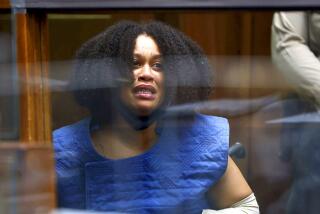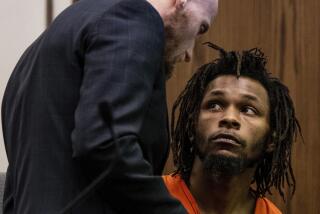James Holmes’ psychiatrist warned he may pose threat
CENTENNIAL, Colo. — About a month before the Aurora movie theater rampage left 12 dead and at least 70 injured in July, James E. Holmes told a psychiatrist he was having homicidal thoughts and she concluded he could pose a danger to the public, according to documents released Thursday.
University of Colorado-Denver psychiatrist Dr. Lynne Fenton told a campus police officer about her concerns June 12, the day after she met with Holmes for their only session. Her fears were revealed Thursday when the new judge presiding over the case unsealed a host of search warrants and arrest documents.
Fenton also told Lynn Whitten, a campus police officer, that after she stopped seeing Holmes he “threatened and harassed her via email/text messages,” the documents said.
Whitten deactivated Holmes’ ID so he could not get into university classrooms and laboratories, the documents say. That appeared to contradict what university officials have said: that Holmes was not banned from the university because of a threat but because his ID was deactivated as part of the normal student withdrawal process.
It was unclear whether Aurora police knew of Holmes’ threats before they interviewed Whitten on July 21, the day after the mass shooting. Holmes, now 25, is accused of opening fire during a premiere of the latest Batman movie, “The Dark Knight Rises.”
The once-promising neuroscience doctoral student at the university is charged with 166 counts of first-degree murder, attempted murder and weapons charges. He had flunked an oral exam in early June, began withdrawing from the university June 10 and met with Fenton on June 11.
Details about the case have been tightly sealed from the earliest days of the investigation. Yet on Thursday, District Judge Carlos A. Samour Jr. reversed previous rulings on public access and made public the arrest affidavit and 12 search warrants.
Samour took over from Chief Judge William Sylvester on Monday after Dist. Atty. George Brauchler of Colorado’s 18th Judicial District announced he would seek the death penalty.
Sylvester withdrew because of the time constraints that come with a capital punishment trial, which would leave him little time for administrative duties. Holmes’ trial, initially scheduled to begin Aug. 5, has been pushed back to February at the earliest.
Holmes’ attorneys are widely expected to use an insanity defense. They had offered a guilty plea in return for a life sentence without possibility of parole.
The newly unsealed documents give glimpses not only into the early hours of the investigation but into Holmes himself. A search warrant for his apartment — which had been booby-trapped, presumably to kill anyone who entered — revealed a student’s life that seemed at once mundane and bent on destruction.
Along with chemicals used for explosives, rounds of ammunition, pistol cases and paper targets, police seized movie posters, video games, apartment lease papers, numerous computers, 48 containers of beer and other liquor and stacks of school textbooks. They found prescription medication for sertraline, a generic version of Zoloft used to treat depression, panic disorder and obsessive-compulsive disorder; and Clonazepam, usually prescribed to treat anxiety and panic attacks.
And they found a Batman mask, the documents say.
Much of the information in the documents had come out at Holmes’ preliminary hearing in January. Moviegoers at the Aurora theater on July 20 told police they saw a man who fit Holmes’ description sit in the first row but then leave through the emergency exit before the movie started. At 12:38 a.m., an assailant burst through the emergency door, threw a canister of tear gas and began shooting.
Police have said records show Holmes went on a shopping spree that started in May, amassing semiautomatic weapons, large quantities of ammunition, military-style gear, chemicals that could be used for explosives and tear gas canisters.
The documents also shed some light on a notebook that Holmes mailed to Fenton, which was found in a university mail room after the shooting. The notebook was described in search warrants as brown with a placard on the cover that said “James Holmes.” Also written on the outside of the notebook were the words, “My Life.”
Police said “it appeared to be a journal,” but the writings were “unknown.” Tucked into the notebook were twenty $20 bills that had been burned. There was a sticky note on the outside with an infinity symbol on it.
The notebook, which is still sealed, has been a bitterly contested issue. The prosecution says it should be admitted into evidence, but the defense says it is part of doctor-patient privileged communication.
Next week the judge will continue to hear arguments on whether a FoxNews.com reporter will have to divulge her law enforcement sources who told her about the contents of the notebook despite a gag order.
More to Read
Sign up for Essential California
The most important California stories and recommendations in your inbox every morning.
You may occasionally receive promotional content from the Los Angeles Times.










